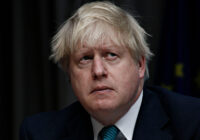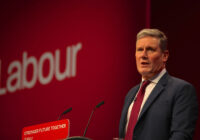In London, dog owners are taking to the streets to call for a people’s vote on Brexit.
Dogs are uniting people in a climate of Brexit uncertainty and helping to change the global image of “immigrant-loathing Brits.” This is the crux of a new campaign that recently took the media by storm, as hundreds of furry friends swamped the streets of London on October 7 to “bark out” for a second “Wooferendum.”
Daniel Elkan, 45, is a self-confessed vessel for canine opinion and the brainchild behind the “pawlitical” campaign, which supports a people’s vote for a second Brexit referendum. He said it was launched “by the dogs for the people” and aimed to make the “biggest bark in history” because Brexit will not only have an impact on humans, but on animal welfare too.
Backed by public figures like Badger Trust chief Dominic Dyer, the campaign has cultivated a “gentler” dialogue between pro and anti-Brexit supporters. It’s now considered an antidote juxtaposing the divisory angry rants that have swamped social media so relentlessly since 48% of voters opted to remain in the European Union.
He may just be onto something. The confusion of Brexit has not only contributed to the segregation and alienation of already marginalized communities. It has also divided families, broken friendships and generated stereotypes on both sides of the debate, said one dog owner at the march.
But the Wooferendum has seduced even the most hardline of dog-loving Brexiteers into sharing the campaign video and poster images of dogs woofing out to “stop Brexit.” And if it has demonstrated one thing, said another protester, it’s the fact “people care more about dogs than they do about humans — and I’m definitely one of them.”
BARKING OUT TO STOP BREXIT
The march began at Waterloo Place, which was dotted with a number of “pee stations” for dogs to “cock a leg” over taped cardboard images of various politicians, including Nigel Farage, Jacob Rees-Mogg and Boris Johnson. Crowds roared with laughter when the first dog did its deed. Demonstrators then marched on to Parliament Square. The event culminated at 10 Downing Street, where Elkan was joined by core members of his team to deliver a “PETition” to Prime Minister Theresa May.
Just days before the march, I had been invited to join him and his team at an Italian restaurant in King’s Cross, where a Swiss camera crew filmed them planning ahead of the event.
Elkan said the idea for a Wooferendum campaign came to him a year ago when he “woke up one morning to the realization that “dogs don’t like Brexit.” After making a bunch of hand-made signs stating “Stop Brexit #Wooferendum,” he approached random dog-owners in his local high street to photograph their pets with the signs.
He said “dogs and their owners were only too keen to get involved,” and the way in which their photographs began to spread across Twitter and Facebook was “social proof [of] how more and more people don’t want Brexit and are barking out against it.”
“Brexit is no joke,” he told me, “but the Wooferendum is approaching it in a way that’s fun and engaging, yet has a serious message: we want to stop Brexit.”
He said the response from dog-owning Brexiteers in parks where he distributed “wooflets” has been “unprecedented” and helped strike up conversations with people he would not normally discuss the issue with.
“The dialogue would begin with the dog, so it was a gentler way of starting up a conversation about something that’s literally divided the country,” he said. “Some Brexiteers even let me take pictures of their dogs because they felt it was just really sweet. It’s a tough dry topic people find hard to discuss, yet find easier if they can talk about it through their dog.”
He said Brexit didn’t just happen two years ago, but is something that has festered in the very fabric of British society since the 1980s — “long before it was even a twinkle in Nigel’s Farage’s eye.”
“I used to do the paper round back then and I’d read headlines that screamed how eurocrats would ruin our lives with rules to stop us eating tinned peas, or stop hairdressers cutting blonde hair, or make all our lovely bananas straight — you name it, Europe was responsible.
“And whenever I stuck The Daily Mail through one letterbox, the dog on the other side would yank it out my hand and you’d hear the sound of it getting ripped to shreds.”
He said the memory remained in the recesses of his subconscious mind, leading to the campaign ethos “by the dogs, for the people.”
The UK, though, was “driving off a cliff,” he said, because of an “uninformed” decision made two years ago when people were “lied to and misled.” And now, he said, it was undemocratic to “tell 48% to just shut up and let it happen.”
But he said the British people who voted Leave also know more now than they did back then — and not just about the impact of Brexit on humans, but on animal welfare too. According to the Royal College of Veterinary Surgeons (RCVS), there are 23,000 vets registered in the UK, of which 7,700 are from the remaining 27 EU member states. Some 95% of vets in the UK working to protect public health and food safety are trained in EU countries. Furthermore, half the UK’s annual intake of about 2,000 vets also qualify in EU countries.
An RCVS spokesperson said a no-deal Brexit scenario impacting movement of people would “increase barriers to veterinary recruitment” — a situation that threatens to “shrink” the veterinary workforce and puts animal welfare and public health at risk.
Elkan said there are also concerns for domestic animals with rising vet costs and the impact of a no-deal scenario on supply chains, making it difficult to get hold of medicines. Exiting the EU, he said, could also leave the current pet passport system defunct, which means domestic animals could be waiting months before they can travel with owners.
He said it was unlikely the UK would get a Brexit deal that mirrors current arrangements, and contrary to the sovereignty lauded by Brexiteers, exiting would disempower the UK as it goes “cap in hand” seeking trade deals with countries outside the EU.
WOOFERENDUM
About the Wooferendum campaign itself, he said it sought to change the global image of “Brexit-supporting, immigrant-loathing Brits” generated by the likes of Brexiteers such as David Davis, Boris Johnson, Dominic Raab, Jacob Rees-Mogg, Nigel Farage and Jeremy Hunt.
“We don’t want this image of us. We want the world to see us as a nation of dog-loving people famous for our sense of humor and rational disposition.” Following the response of the global media, the campaign, said Elkan, appears to have accomplished just that.
He added: “We also need to decide what kind of country we’re going to be: insular, xenophobic and small-minded, or one which understands openness and the need to embrace diversity?”
Should the People’s Vote march on October 20 pull out the stops for a second referendum, the Wooferendum campaign “could run and run,” said Elkan. “It’s like the Friar Tuck of the Brexit battle,” he added. “We’ll be campaigning to ensure people understand the benefits we get from Europe, the value of people from Europe and beyond, and of us being able to live and work there too.
“And the dogs are going to have a great say in that. In fact, dogs can do a lot. They can engage people and the media, lift spirits and project a bigger voice.
“So we had to let dogs out to do this. In fact, I think they were desperate to get out, but I did help to open the door.”
The views expressed in this article are the author’s own and do not necessarily reflect Fair Observer’s editorial policy.
Support Fair Observer
We rely on your support for our independence, diversity and quality.
For more than 10 years, Fair Observer has been free, fair and independent. No billionaire owns us, no advertisers control us. We are a reader-supported nonprofit. Unlike many other publications, we keep our content free for readers regardless of where they live or whether they can afford to pay. We have no paywalls and no ads.
In the post-truth era of fake news, echo chambers and filter bubbles, we publish a plurality of perspectives from around the world. Anyone can publish with us, but everyone goes through a rigorous editorial process. So, you get fact-checked, well-reasoned content instead of noise.
We publish 2,500+ voices from 90+ countries. We also conduct education and training programs
on subjects ranging from digital media and journalism to writing and critical thinking. This
doesn’t come cheap. Servers, editors, trainers and web developers cost
money.
Please consider supporting us on a regular basis as a recurring donor or a
sustaining member.
Will you support FO’s journalism?
We rely on your support for our independence, diversity and quality.






